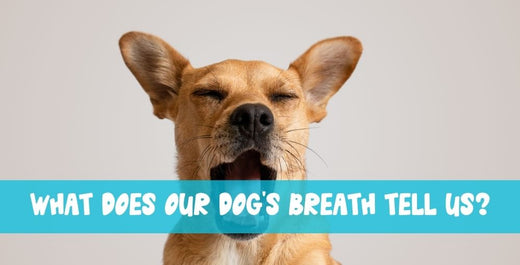
Dog Breath: A Powerful Indicator
Share
Key Points

- Normal Dog Breath smells of food that a dog eats.
- Change in breath smell can indicate a hygiene or medical issue.
- Any change in breath smell must be investigated by a vet with complete information about accompanying symptoms, if any.

Chicken Breath! Stinky! One thinks of these names when asked to describe their dog’s breath. And phew! That is natural because your dog’s breath usually smells of the food they eat. A change in breath smell can indicate serious health issues. Read along to “sniff” out what your dog is trying to communicate about their well-being and possible actions to prevent or resolve them.

Periodontal Disease
Periodontal Disease is caused by bacteria overgrowth in the mouth which results in tartar or plaque buildup and may lead to gum inflammation, called gingivitis. This is the initial stage of inflammation with symptoms of red or swollen or bleeding gums and smelly breath. In case of teeth with yellow, brown, or black buildup, swollen or bleeding gums or loose/missing teeth, please see your vet immediately for scaling or treatment.
Kidney Disease
If your dog’s breath smells like ammonia or metal, with excessive thirst and urination, these may indicate kidney dysfunction. This smell is due to urea buildup in the blood in case of kidney failure. Excessive urea, also known as uremia, can cause ulcers in the mouth. It is critical to see the vet if your dog shows such changes in breath or mouth. Kidney Disease will also require a special diet to be formulated or bought for your dog to manage the level of protein being ingested.
Liver Disease
Starting with breath smelling like Sulphur, canine liver disease usually presents with multiple symptoms. These include lack of appetite, yellowing gums and corneas, vomiting, seizures, and ascites (fluid buildup) in the abdomen. Periodic health checks and examination of symptoms are critical for early diagnosis and treatment.
Diabetes
A fruity-sweet or acetone-like breath could be a symptom of canine diabetes. It is a worrisome but treatable/manageable condition. Other symptoms include frequent drinking and urination, increased appetite, weight loss, and impact on vision. Spotting diabetes symptoms early with your vet can help with better intervention and treatment.
Unusual Eating
While on walks, dogs may eat dead animal remains, garbage, poop, or vomit, immediately leading to stinky breath. Eating their poop or poop of other animals is called Coprophagia. It can cause bad breath, nausea, and GI issues due to bacteria in the poop. All such unusual eating must be investigated and addressed by your vet.
For optimal oral hygiene, it is essential to brush your dog’s teeth every day with a toothpaste specifically formulated for dogs, along with a soft toothbrush.
Caution: Human toothpaste must not be used for brushing your dog’s teeth, as it can contain certain ingredients toxic for dogs.

